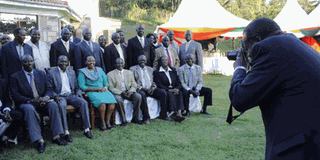Church leaders condemn Narok clashes

Baringo County Governor Benjamin Cheboi takes a picture of the clergy at Kabarnet during a prayer meeting to usher in New Year on December 31, 2015. PHOTO | CHEBOITE KIGEN | NATION MEDIA GROUP
What you need to know:
- Church leaders have condemned the violence in Narok County that has displaced more than 2,000 people.
- Bishop Daniel Chemon of Full Gospel Churches of Kenya said the situation in Narok County was a threat to national security.
- The clergy also praised leaders for the peace witnessed in the North Rift, saying it had given residents time to engage in meaningful development.
- The North Rift has not known peace for years.
Over 100 church leaders have condemned the violence in Narok County that has displaced more than 2,000 people.
When they met Governor Benjamin Cheboi at his residence in Kabarnet on Thursday, they said the two communities should co-exist peacefully for the sake of development.
Bishop Daniel Chemon of Full Gospel Churches of Kenya said the situation in Narok County was a threat to national security.
“We pray for peace and appeal to residents to remain calm. The government should deploy more officers to beef up security in the area,” he said.
Dozens of houses belonging to Kipsigis and Maasai villagers were torched in a retaliatory attacks following the killing of two herders in Maasai Mau Narok Forest on Wednesday, last week.
The clergy also praised leaders for the peace witnessed in the North Rift, saying it had given residents time to engage in meaningful development.
Banditry has not been reported in Baringo, West Pokot, Elgeyo-Marakwet, Turkana and Samburu counties for the last three months.
Mr Cheboi recently termed the peace as encouraging.
PEACEFUL COEXISTENCE
“Peaceful co-existence, especially on the borders of Tiaty, Baringo North and Baringo South has enabled us to speed up development. This should be maintained,” Mr Cheboi said.
The war on insecurity was boosted a few weeks ago when more than 100 bandits publicly denounced cattle rustling and promised to promote peace.
The North Rift has not known peace for years. More than 400 people have been killed in the last one year.
The number includes 19 Administration Police officers killed in Kapedo on the Turkana-Baringo counties border.
Meanwhile, an Esoit Village family in Olpusimoru, Narok is mourning the loss of their Standard Seven child killed as they fled the clashes on Boxing Day.
Mr James Kones, 64 and his wife Violla Chepkoskei are yet to come to terms with the tragic events that robbed them of their second born child.
Their house was also razed by the attackers.
Like many other villagers, the family slept in the cold on December 26, fearing attacks as tension mounted. They were in a thicket near their home at 4am when Mr Kones spotted a group of about 100 armed youths approach.
He immediately alerted his wife and children and told them to flee.
Only later, around 6am, did they notice that a member of the family was missing.
Mr Kones said his son Amos Kipkorir, must have stumbled and fallen.
POLITICS PLAYED ROLE
Like many other families, Mr Kones’ sought refuge at Township Primary School in Olenguruone.
Though the Maasai insist that the cause of the fighting was the killing of two herdsmen, administrators insist politics played a role.
At a meeting in the troubled area on Sunday where Interior Cabinet Secretary Joseph Nkaissery ordered a ceasefire, speakers pointed to the possibility of politicians fanning and funding the conflict.
Speakers, including Rift Valley Regional Security Coordinator Osman Warfa named a man they said was at the centre of the Mau controversy, prompting Mr Nkaissery to order his arrest.
The man, popularly known as Kalyaso Tol Tol, is said to be wealthy and well-connected.
According to Olpusimoru MCA Wilson Masikonte, the standoff among leaders over the Mau Forest has political undertones, with the 2017 elections in mind.






